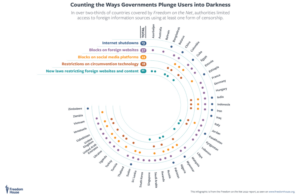Global Internet Freedom Declines For 12th Consecutive Year; Freedom House Releases “Freedom on the Net 2022” Report
From a Freedom House News Release:
Global internet freedom declined for a 12th consecutive year as more governments erected digital barriers designed to censor dissent and monitor users, according to a report released today by Freedom House. The study finds that more than three-quarters of the world’s internet users now live in countries where authorities punish people for exercising their right to free expression online. The sharpest drop in internet freedom took place in Russia, as the Kremlin intensified its efforts to stifle domestic opposition and muzzle independent media in the wake of its illegal and unprovoked invasion of Ukraine.
The new report, Freedom on the Net 2022: Countering an Authoritarian Overhaul of the Internet, finds that the internet is more fragmented than ever, with a record number of governments imposing restrictions on what billions of people can access and share online—whether by blocking foreign websites, hoarding personal data, or increasing control over their countries’ technical infrastructure. The moves by repressive leaders, both within their borders and on the international stage, seek to divide the open internet into a patchwork of repressive enclaves where they can advance their narrow interests and cement their hold on power.
{Clip]
Report findings:
Global internet freedom declined for the 12th consecutive year. The sharpest downgrades on the report’s 100-point scale were documented in Russia (−7), Myanmar (−5), Sudan (−4), and Libya (−4). Following the Russian military’s disastrous invasion of Ukraine, the Kremlin dramatically intensified its ongoing efforts to suppress domestic dissent and accelerated the closure or exile of the country’s remaining independent media outlets. In at least 53 countries, users faced legal repercussions for expressing themselves online, often leading to draconian prison terms.
Governments are breaking apart the global internet to create more controllable online spaces. A record number of national governments blocked websites with nonviolent political, social, or religious content, undermining the rights to free expression and access to information. A majority of these blocks targeted information sources that were located outside of the country. New national laws posed an additional threat to the free flow of information by centralizing technical infrastructure and applying flawed regulations to social media platforms and the management of user data.
Users in China have the least internet freedom for the eighth consecutive year. Censorship intensified during the 2022 Beijing Olympics and after tennis star Peng Shuai accused a high-ranking Chinese Communist Party (CCP) official of sexual assault. The government continued to tighten its control over the country’s booming technology sector, including through new rules that require platforms to use their algorithmic systems to promote CCP ideology.
A record 26 countries experienced internet freedom improvements. Two of the larger improvements occurred in The Gambia (+3) and Zimbabwe (+3). Despite the overall global decline, civil society organizations in many countries have led collaborative efforts to improve legislation, develop media resilience, and ensure accountability among technology companies. Successful collective actions against internet shutdowns offered a model for further progress on other problems like commercial spyware.
Internet freedom in the United States improved marginally for the first time in six years. There were fewer reported cases of targeted surveillance and online harassment during protests compared with the previous year, and the country now ranks ninth globally, tied with Australia and France. The United States still lacks a comprehensive federal privacy law, and policymakers made little progress on the passage of other legislation related to internet freedom. Ahead of the November 2022 midterm elections, the online environment was riddled with political disinformation, conspiracy theories, and harassment aimed at election workers and officials.
Human rights hang in the balance amid a competition to control the web. Authoritarian states are vying to propagate their model of digital control around the world. In response, a coalition of democratic governments has increased the promotion of online human rights at multilateral forums, outlining their vision for a free and open internet. However, their progress remains hampered by problematic internet freedom practices in their own countries.
Freedom on the Net is an annual study of human rights in the digital sphere. The project assesses internet freedom in 70 countries, accounting for 89 percent of the world’s internet users. This report, the 12th in its series, covered developments between June 2021 and May 2022. More than 80 analysts and advisers contributed to this year’s edition, using a standard methodology to determine each country’s internet freedom score on a 100-point scale, with 21 separate indicators pertaining to obstacles to access, limits on content, and violations of user rights.
Direct to Complete News Release
Report Resources
Full Text Report and All Materials
Report Data
Filed under: Associations and Organizations, Data Files, Management and Leadership, News, Patrons and Users, Reports
About Gary Price
Gary Price (gprice@gmail.com) is a librarian, writer, consultant, and frequent conference speaker based in the Washington D.C. metro area. He earned his MLIS degree from Wayne State University in Detroit. Price has won several awards including the SLA Innovations in Technology Award and Alumnus of the Year from the Wayne St. University Library and Information Science Program. From 2006-2009 he was Director of Online Information Services at Ask.com.



